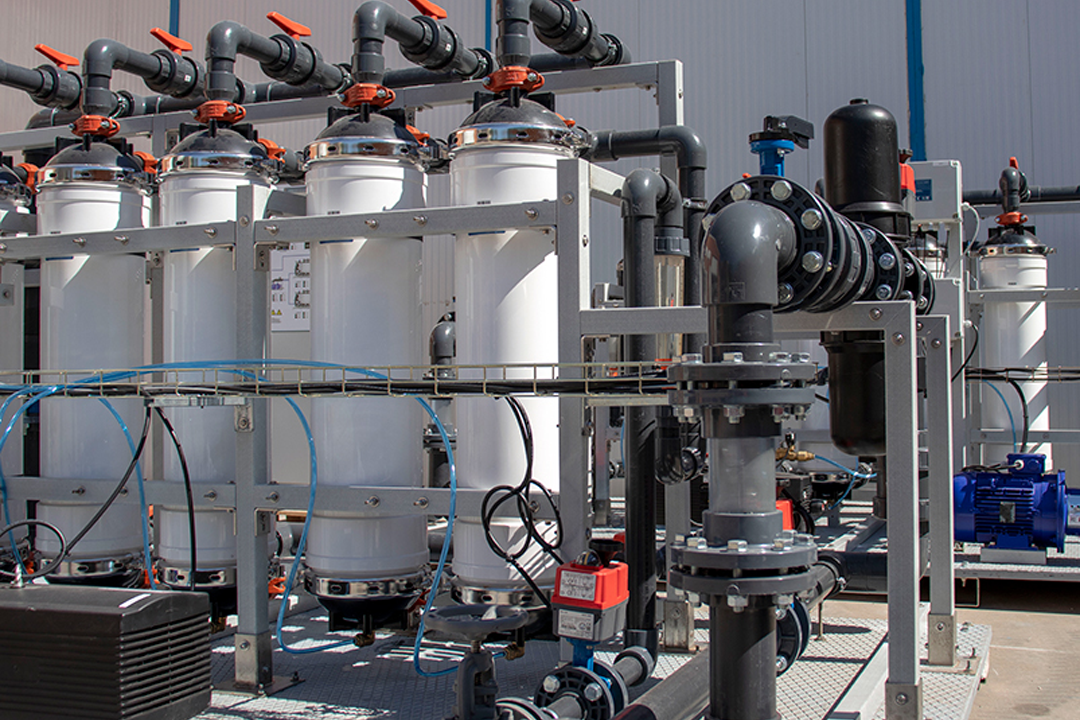Ultra Filtration Plant

An Ultra Filtration (UF) Plant is a water treatment system designed to remove suspended solids, microorganisms, and other impurities from water through a semi-permeable membrane process. It operates by using a pressure-driven membrane filtration technique to separate particles from water that are larger than the membrane pore size, typically ranging from 0.01 to 0.1 microns. UF technology is widely used for water purification, providing high-quality filtrate for various applications, including drinking water, industrial processes, and wastewater treatment.
Key Features of Ultra Filtration Plant:
Membrane Filtration: UF membranes have tiny pores that can filter out large organic molecules, bacteria, viruses, and colloidal particles while allowing water and smaller dissolved substances like salts to pass through.
High Efficiency: Ultra filtration is effective at removing particles that are smaller than microfiltration, but larger than reverse osmosis filtration. It is highly efficient at removing suspended solids, bacteria, and viruses from water.
Types of Membranes: UF membranes are typically made of materials such as polyethersulfone (PES), polyvinylidene fluoride (PVDF), or ceramic materials. These membranes are designed for long-term durability and resistance to fouling.
Applications:
Drinking Water Purification: Used in municipal water treatment plants for safe drinking water production.
Industrial Water Treatment: Applied in industries like food and beverage, pharmaceuticals, and electronics to ensure high-quality water for processing and production.
Wastewater Treatment: Used to treat wastewater by removing organic matter and pathogens before discharging or reusing the water.
Desalination: Works as a pre-treatment process before reverse osmosis to improve efficiency and reduce fouling in desalination plants.
Operational Process:
Pre-Treatment: Water usually undergoes pre-treatment to remove large particles and contaminants before entering the UF system.
Filtration: Water is passed through the UF membranes under pressure, where particles are filtered out while the purified water (permeate) flows through the membrane.
Backwashing & Cleaning: To prevent fouling, UF systems periodically undergo backwashing or chemical cleaning to maintain membrane performance and longevity.
Advantages:
Energy Efficiency: Compared to reverse osmosis (RO), UF requires less energy as the pressure used is lower.
Environmentally Friendly: UF plants have low chemical usage and minimal waste generation.
Modular Design: The plant design is scalable and modular, making it easy to expand or adjust the capacity based on demand.
High-Quality Filtrate: Provides high-quality filtered water with minimal dissolved contaminants, which can be further treated for specific needs.
Challenges:
Membrane Fouling: Over time, UF membranes may get fouled with organic materials, bacteria, and other contaminants, requiring regular cleaning and maintenance.
Cost: While UF is more affordable than reverse osmosis, the initial setup and maintenance costs can be significant depending on the scale and application.
Maintenance: Regular maintenance is needed to ensure optimal performance. This includes checking membrane integrity, cleaning membranes, and monitoring system pressure and flow rates.
Conclusion:
Ultra Filtration plants are highly efficient water treatment solutions, offering effective filtration for both municipal and industrial needs. Their ability to remove fine particles and pathogens makes them a vital component in ensuring clean, safe water for various applications. However, like any filtration technology, they require proper maintenance to ensure long-term performance.
Lenntec – Water Treatment Solutions for a Cleaner, Safer Future!
© 2024 Created with Lenntec Team.
Service
Reverse Osmosis (RO) Plant
Water Softening Plant
Ultra Filtration Plant
Wastewater Treatment Plant
Zero Liquid Discharge Plant
Support
About Us
Privacy Policy
Terms and Conditions
Contact
FAQ
Contacts
(352) 683-0000
34606 Spring Hill, Florida, United States

